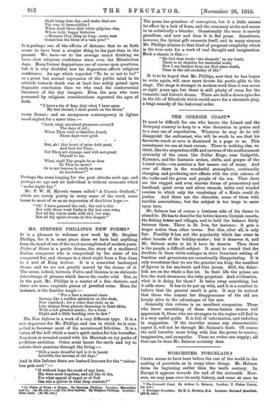MIL STEPHEN PHILLIPS'S NEW POEMS.*
IT is a pleasure to welcome new work by Mr. Stephen Phillips, for it is some years since we have had anything from the hand of one of the most accomplished of modern poets. Pietro of Siena is a poetic drama, the story of a mediaeval Italian conqueror who is vanquished by the sister of his conquered foe, and changes in a short night from a Don Juan to a sort of King Arthur. It is a somewhat hackneyed theme, and we are not greatly moved by the drama of it. The scene, indeed, between Pietro and Gemma is an elaborate interchange of phrases which leaves the reader cold. But, as in the past, Mr. Phillips is a master of a fine rhetoric, and there are some exquisite pieces of jewelled verse. Here, for instance, is the familiar magic :- "For a face a moment since
Sprung like a sudden splendour on the dusk, Now vanished; for a voice that stole on us Like strings from planets dreaming in faint skies, With a low pleaded music ; for a form Slight and a little bending over in dew."
The New Inferno is a work of a very different type. It is a new departure for Mr. Phillips, and one in which he is com- p, lied to forswear most of his accustomed felicities. It is a vision of the hell which a man's spirit makes for him hereafter. Napoleon is revealed seated with his Marshals on icy peaks of profitless ambition. Other souls haunt the earth and try to satiate their passions through the living :— " Still a more dreadful hell is it to haunt
Invisible the taverns of old days."
And in this Inferno there are bastard heavens for the "colour- less pale soul ":— " If without hope the souls of any here, His were most hopeless, and all like to his, For what appeal of angel or of God Can stir a quiver in that deep content ? "
• (1) Pistm of Sirsa : a Drama. By Stephen Phillips. London : Macmillan and Co. [21. 84. net.]—(2) The Now Difirmr. By Stephen Phillips. London : John Lane. t4s. 64. net.]
The poem has grandeur of conception, but it a little misses its effect by a lack of form, and the summary at the end seems to us artistically a blunder. Occasionally the verse is merely grandiose, and now and then it is flat prose. Sometimes, however, the lyrical gift reasserts itself, and in many stanzas Mr. Phillips attains to that kind of pregnant simplicity which
is the true note for a work of real thought and imagination.
Such a stanza is this :— "He lied that wrote 'she sleepeth' on my tomb,
There is no slumber for immortal souls, Now I am further from my God since death, Than in the old credulity of life."
It is to be hoped that Mr. Phillips, now that he has begun to write again, will once more devote his poetic gifts to the stage. The stage is stronger in modern work than it was seven or eight years ago, but there is still plenty of room for the romantic and historic drama. There are half-a-dozen episodes in the life of Elizabeth which would serve for a chronicle play,
a tragi-comedy of the historical order.


















































 Previous page
Previous page